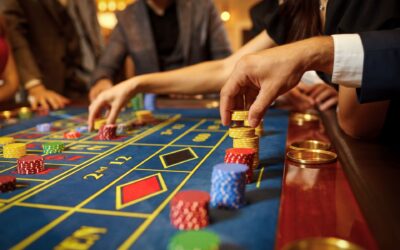Last week I wrote a blog explaining why the plan to issue online sports betting licenses in New York will be a disaster. [LINK] Not only will the tax rate be the highest in the nation – possibly a ridiculous 71% – but the entire law is on its face unconstitutional.
In a case involving fantasy sports, trial court judge Gerald Connolly forcefully concluded that the New York Constitution prevents the State Legislature from legalizing any form of sports betting. Judge Connolly focused on the Constitution’s prohibition on “pool-selling, book-making, or any other kind of gambling.” He also emphasized that the Constitution required the Legislature to enact laws to outlaw, not legalize gambling.
On appeal, the Supreme Court Appellate Division agreed. This Court expressly rejected the attempt by the Legislature to declare fantasy sports as a game of skill and therefore not gambling. The Opinion held that the test was whether a game’s outcome depends in a material degree upon chance, notwithstanding that skill of the contestants may also be a factor.
The case is now on appeal to the state’s highest court. In a recent hearing, Justice Eugene Fahy focused on the weird situation created by calling fantasy sports, but not straight-up sports betting, contests of skill. According to Buffalo’s Spectrum News 1, he said to the state’s attorney, “You’re arguing that I cannot place a bet on whether the Buffalo Bills win their next game, but I can place a bet on whether or not their lead receiver Stefon Diggs catches the ball ten times or six times.”
The Court of Appeals will probably declare what lawmakers called Interactive Fantasy Sports (“IFS”) illegal as a form of gambling. If the Justices limit their discussion to skill versus luck, the newly legalized online sport betting and existing in-person sports books in the state’s seven casinos can breathe easy for a while. But the Court will have to discuss whether the Legislature can make up its own definition for words like “gambling,” which appear in the Constitution. In the worst case, the Court will agree with Judge Connolly. In fact, it is difficult to see how any court would allow the Legislature to legalize any form of sports betting without first amending the state’s Constitution.
Here’s the language from Article 1 Section 9, which is causing all the problems:
“[E]xcept as hereinafter provided, no lottery or the sale of lottery tickets, pool-selling, book-making, or any other kind of gambling, except [the State Lottery and pari-mutual betting on horse races] . . . , and except casino gambling, at no more than seven facilities as authorized and prescribed by the legislature shall hereafter be authorized or allowed within this state; and the legislature shall pass appropriate laws to prevent offenses against any of the provisions of this section.”
The Constitution also allows bingo.
The most obvious problems are not only that “book-making, or any other kind of gambling,” is prohibited, but that the Legislature is only supposed to act to make sure the ban is enforced, not to legalize them.
I would find it difficult to give a passing grade to a law student who argued that a legislature can authorize book-making under a constitution that expressly tells the legislature to prohibit book-making.
To get around the Constitution with IFS, the Legislature declared fantasy sports, not “gambling.” With regular sports betting, lawmakers had a bigger problem: the express prohibition on “book-making.” So, it simply pretended that making a book was something else.
When the Legislature got the voters to amend the Constitution to add “casino gambling,” lawmakers passed an act expressly allowing the seven casinos to take in-person sports bets. So, lawyers for the state are now arguing that legislators defined sports betting as a form of “casino gambling.”
But the Legislature did not have the power to do that. You can’t take an express Constitutional prohibition on “book-making,” pass a statute authorizing book-making and say, “It may look like book-making; it’s actually casino gambling.”
Casino gambling has a long, well-established definition: It is a banking and percentage game. Players go to a place with tables and machines to place bets against the house – a banking game – where the operator participates in the game with a percentage advantage in its favor – a percentage game.
Modern book-making has also been around for more than 300 years. Bookies accept and pay off wagers on sports contests and other contingent events at agreed-upon odds; they used to write bets down in books.
So why not just amend the State Constitution? Constitutions are supposed to be difficult to change, and New York has put in imposing obstacles. To even get on the ballot, a proposed amendment must first pass both houses of the State Legislature in two separate years.
Imagine how much money would be spent on lobbyists by potential operators in New York and competitors in New Jersey.
This is what is called, in sports, an unforced error. They got the voters to amend the Constitution to add the words “casino gambling.”
All they had to do was have them also delete the words “pool-selling, book-making, or any other kind of gambling.” You don’t actually need those in the Constitution unless you really do intend to prevent the Legislature from authorizing sports betting.
Or, if that was too politically dangerous, instead of just adding “except casino gambling at no more than seven facilities,” make it “except casino gambling, book-making, and pool-selling at no more than seven facilities.”
Maybe this was done on purpose. Gambling proponents were worried that voters might approve casinos, but they might not be in favor of sports betting.
The test for the meaning of words in a Constitutional amendment is what did the voters think. Legislators knew that voters would not think of sports betting when they saw the word “casino gambling,” especially because they left in the prohibition on “book-making and pool-selling.”
To legalize sports betting, politicians are going to have to ask New York voters to amend the Constitution. Or, I suppose, they could try claiming it is a form of bingo.
© Copyright 2021, all rights reserved worldwide. Gambling and the Law® is a registered trademark of Professor I. Nelson Rose, www.GamblingAndTheLaw.com.





0 Comments